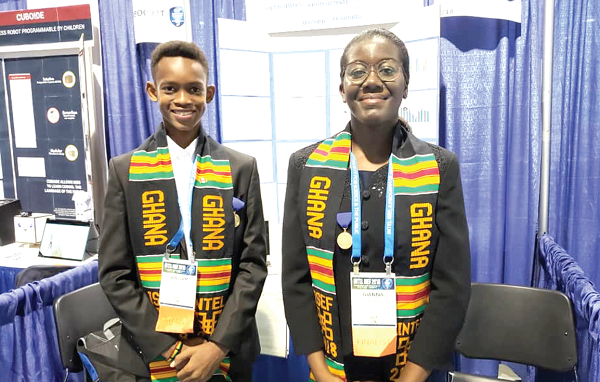
Ghanaian students win top UN award
Two students from Ghana emerged winners of the United Nations (UN) Sustainable Development Goal (SDG) award at the just-ended Intel International Science and Engineering Fair (Intel ISEF) held in Pittsburgh in the United States.
The students, Gianna Nana Ama Boadi Torpey of the SOS Hermann Gmeiner International College and William Thibaud Manirakiza of the Liberty American School, designed a computer algorithm that could detect diabetic retinopathy (damage to the blood vessels in the tissue at the back of the eye) from fundal images faster and as accurate as a doctor.
Advertisement
Their algorithm was adjudged best in the world for addressing a UN SDG.
Speaking about their experience, the students, in a joint statement, said the ISEF programme provided a wonderful networking and learning opportunity for them to meet other young innovators from around the world who were doing amazing things.
“We also attended seminars on public speaking and scientific communication by some of the world’s finest scientific journalists.
“Finally, Intel provided us with hands-on training on some of their state of the art technology tools,” they said.
Technology
In a country where the doctor-to-patient ratio is quite low, the students expressed the hope that their technology would greatly improve the diagnosis and treatment of diabetic retinopathy which currently affects many people in Ghana and 93 million people globally.
The Intel ISEF is said to be the largest and most prestigious international pre-collegiate science competition in the world.
Each year, more than 1,800 student finalists earn the right to attend the Intel ISEF as a result of their excellent scientific projects chosen from over seven million applicants globally.
This year's programme attracted 1,792 finalists from 81 countries, representing every region of the world. The Africa region was represented by students from Egypt, Tunisia, Ghana, Nigeria, Kenya, Zimbabwe and South Africa.
MISE
The Founder of the MISE Research Programme, Mr Joel Dogoe, selectors of the Ghanaian students, stated that the Intel ISEF programme provided the young scientific minds (students) the opportunity to showcase their talents on an international stage, where doctoral-level scientists judged their work on the basis of the students’ creative ability and scientific thought, as well as the thoroughness, skill and clarity shown in their projects.
A total of about 1,200 scientists and engineers, representing 22 scientific disciplines from leading universities and international organisations, including Stanford, Carnegie Mellon, the United States Agency for International Development (USAID) and the UN, reviewed the over 1,300 projects at the conference.



